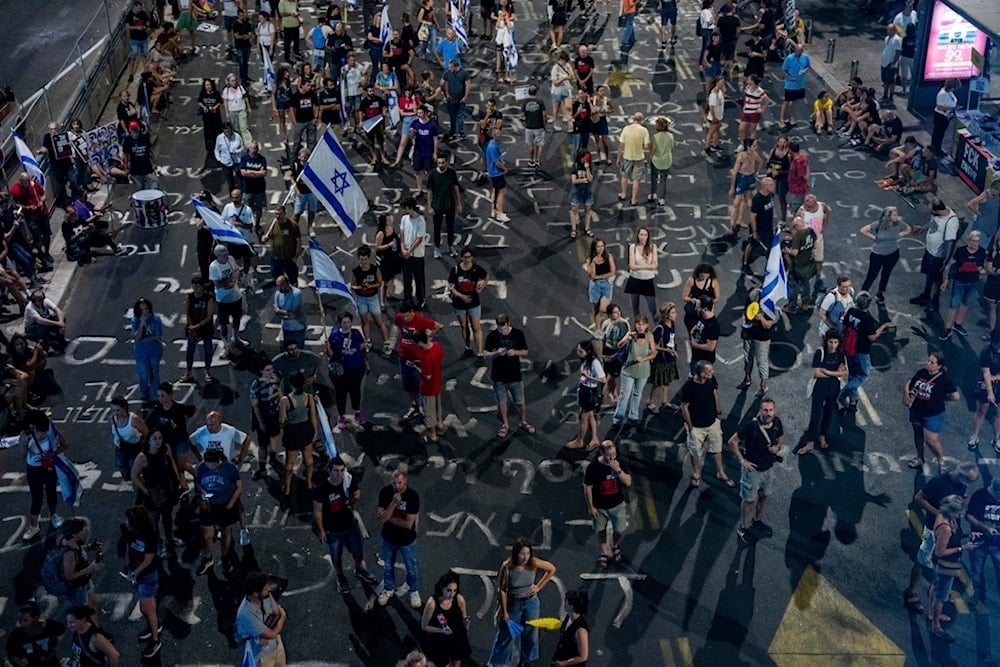Civil disobedience, strikes inbound as Israelis demand captives deal
The Israeli occupation is bracing for a heated Monday as settlers pledge to protest strongly against the government's inaction regarding the captives in Gaza.
-

Israeli settlers protest against Prime Minister Benjamin Netanyahu's government and call for the release of captives held in the Gaza Strip, in Yaffa, occupied Palestine, Saturday, August 31, 2024 (AP)
The streets of occupied al-Quds have witnessed widespread protests against the Israeli government, sparked by the discovery of the bodies of six captives by the Israeli military in a tunnel in Rafah, southern Gaza. The protests have drawn participation from Benny Gantz, former Minister of Security and leader of the State Camp party.
مئات الإسرائيليّين يتظاهرون في القدس المحتلّة مطالبين بإبرام صفقة تبادل للأسرى#فلسطين_المحتلة #غزة pic.twitter.com/SnC62R8yvX
— قناة الميادين (@AlMayadeenNews) September 1, 2024
According to Israeli media, the six captives were found dead either Saturday or Friday.
Two families of the deceased captives refused Israeli Prime Minister Benjamin Netanyahu's request to speak with them. Israeli media reported comments from Mossad Chief David Barnea, who remarked that the controversy surrounding the return of Gaza families to northern Gaza was more complex than the issue of the Philadelphi Corridor.
"My personal position is that it would be better to withdraw from Philadelphi and Netzarim to recover the captives; there is no operational need for these two routes," he stressed.
Netanyahu sacrificing captives
Following the announcement of the discovery of the six captives' bodies, the weekly Israeli cabinet meeting scheduled for Sunday was canceled. Several ministers have expressed their intention to request the government reconsider its stance on the Philadelphi Corridor to facilitate reaching an agreement that would return the Israeli captives.
Israeli newspaper Haaretz quoted a senior Israeli government official who accused Netanyahu of acting brutally, stating, "Netanyahu knows what he's doing, and his hands are stained with blood."
A Likud minister told the Israeli news site Walla! that Netanyahu would find any excuse to stall until all the captives were dead, adding that he had chosen to save his coalition rather than the captives, effectively condemning them to die in captivity.
Israeli media also reported that Security Minister Yoav Gallant is expected to raise the issue of the Philadelphi Corridor at Sunday's cabinet meeting, a move also supported by Shas party leader Aryeh Deri.
Widespread protests, strikes expected
Amid widespread anger among Israeli settlers over the government's policies, Israeli media reported that roads across the occupied Palestinian territories would be closed on Sunday evening as part of planned protests. The mayors of Givatayim and Tel Aviv have announced a strike for Monday in protest of the killing of the six captives and the failure to reach a prisoner exchange deal. Additionally, a number of restaurants and cinemas in central occupied Palestine have decided to close their doors in solidarity with the families of the captives.
The head of the Israeli Labor Union issued a joint statement with the families of the captives, announcing that Ben Gurion Airport would cease operations starting at 8:00 AM on Monday. The statement attributed the lack of progress on the prisoner exchange deal to political considerations and called for a general strike beginning Monday.
Israeli opposition leader Yair Lapid called on labor unions, employers, and local authorities within the Israeli occupation to disrupt the economy. He also petitioned the Knesset Speaker to hold an emergency general meeting to discuss reaching an agreement regarding Gaza.
Lapid criticized Netanyahu and his cabinet, saying, "Netanyahu and the death council decided not to save the six hostages who were alive in Gaza. While there are still hostages alive in the Strip, it is still possible to reach an agreement, but Netanyahu is reluctant for political reasons." He added, "Israel is collapsing, and it is impossible to continue like this."
The incident shook the Israeli political scene, once again, as politicians and activists from the opposition urged protests in response to the government's complacency in regard to the lives of the Israeli captives.
While Gallant maintained that it was too late for captives who were found dead, he affirmed that those who remain in captivity "must be returned home."
His remarks echo voices within the Israeli military apparatus, which believes that a prisoner exchange deal would be the best way forward to release the Israeli captives from the Gaza Strip.
On the other hand, Netanyahu and his far-right allies have placed hurdle after hurdle in the face of the ceasefire talks, as their renewed demands continue to move back the progress made in previous meetings.
Read more: Netanyahu throws temper tantrum at Gallant over ceasefire deal: Axios

 4 Min Read
4 Min Read








